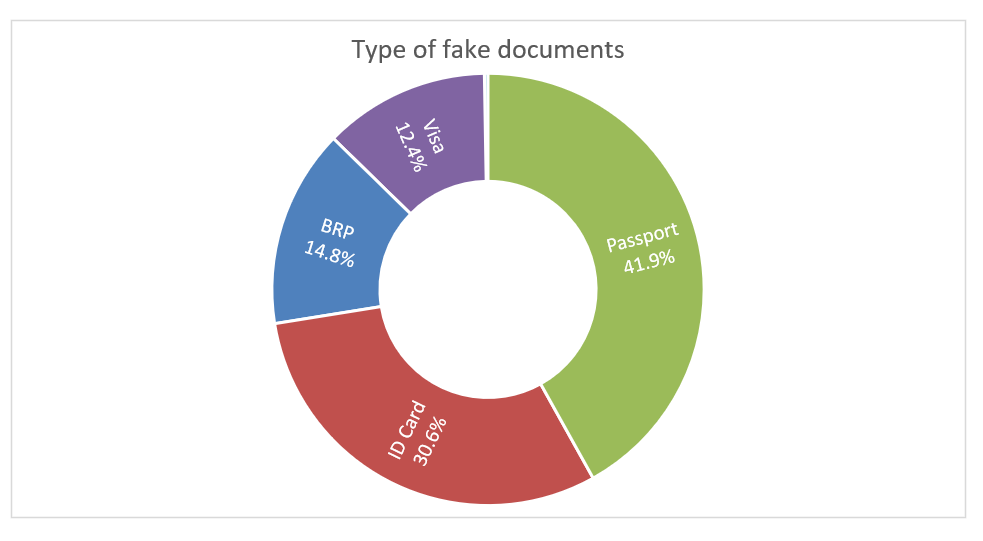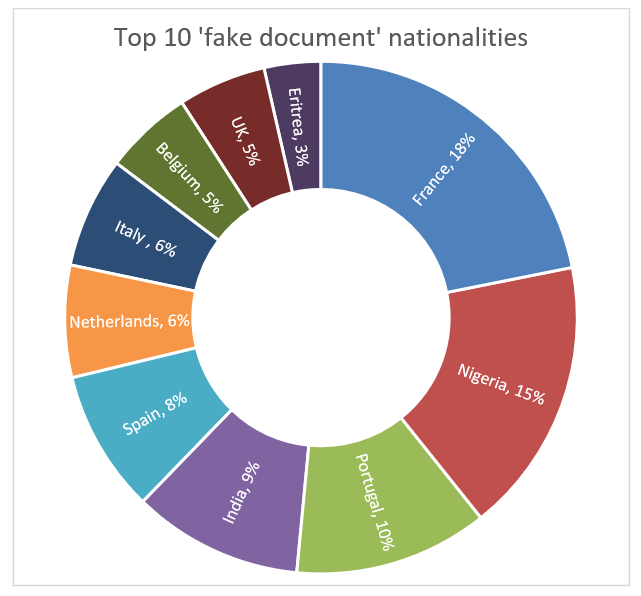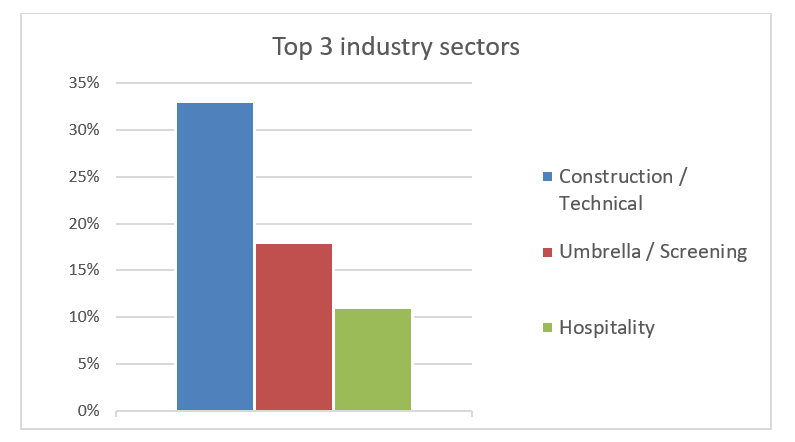A summary of fake identity documents and trends in 2019 – Right to Work checks

In 2019, the number of organisations relying on our checking services continued to grow significantly, across both the public and private sectors. As the number of checks has gone up, so has the number of fake documents identified: we broke a new record for fake identity documents last year!
Our customers use our identity services as part of their Right to Work, Right to Rent, Counter fraud and KYC/AML check processes. In this annual round-up blog, we’ll look at data from those customers who are checking ID for Right to Work in the private sector and highlight some key trends:
What sort of fake documents did we see?
Our helpdesk team consistently see more passports than any other document, with ID cards in a constant second place. Passports are the document of choice for proof of Right to Work as, if the holder claims to be from the EU, they don’t currently need to present any other documents.
In 2019, 42% of the fake documents seen by our helpdesk were passports, down just slightly from 46% in 2018 in favour of ID cards and biometric residence permits (BRPs). Here’s a breakdown of fake documents by document
type:

Which nationality did the holder of the fake document claim to be?
In 2019, our helpdesk team saw fake identity documents from people claiming to represent 55 different nationalities.
The 3 most commonly claimed nationalities were French, Nigerian and Portuguese. The battle for 4th and 5th place varied each quarter between Spanish, Indian, British and the Dutch. A breakdown of the top 10 nationalities across the year is below:

In H2 of 2019 alone, over 20% of the fraudulent documents seen by our helpdesk team purported to be French. Fake French documents were seen by our customers in every single industry sector and they were among the top 3 most common nationalities in every one of them.
The majority of fake Nigerian documents were presented to our customers in the Construction and Medical sectors.
Most Indian documents were found by Construction and Umbrella companies.
Which sectors saw the most fake documents?
In 2019, we saw fake documents from a broad range of different industry sectors, particularly those with a high turnover of applicants, such as recruitment agencies or those checking high-volume, ‘lower-skilled’ staff, including medical recruitment, construction, hospitality and retail. The 3 industry sectors which saw the most fake documents are shown in the graph below:

Construction / Technical covers construction firms and specialist recruitment agencies specifically recruiting into the construction and technical sectors. Checks in this sector are made almost entirely using the TrustID online checking service (TrustID Cloud).
Umbrella services include employee screening services and there may be a correlation between this sector and the construction sector as temporary construction workers may be employed using umbrella service organisations. The mix of fake documents seen across the two sectors is broadly the same.
Hospitality covers both direct hospitality employers (hotels, restaurants and bars) and hospitality-specific recruitment companies. In H1, fake French documents made up 35% of all fake documents identified in this sector. Businesses in this sector use a mix of all the TrustID services.
Conclusion
After another busy year, we have an ever-growing sample size of document data and we are continuing to monitor trends to constantly improve our technology and processes. Our findings from this year’s data highlight the continued risk of seeing fraudulent ID documents used by employees attempting to prove their Right to Work.
- TrustID customers are finding more fake documents than ever. Some documents have even been presented at more than one place of work
- French documents are the most commonly seen fake documents, along with Nigerian, Portuguese and Indian
- As in 2018, the highest number of fraudulent documents were seen in low-cost labour and high turnover employment sectors such as construction, technical recruitment and hospitality.
Want to find out more?
If you’d like to discuss how our services could support you, please get in touch. We’d be happy to arrange an online demo.
Sign up to receive updates
Receive notifications from TrustID direct to your inbox. Simply fill out your email address in the form below.
Want to find out more?
We’d be really happy to chat through your requirements and offer advice on the best service for your business.
Tel: 0118 466 0822 or email us.
Request a callback


